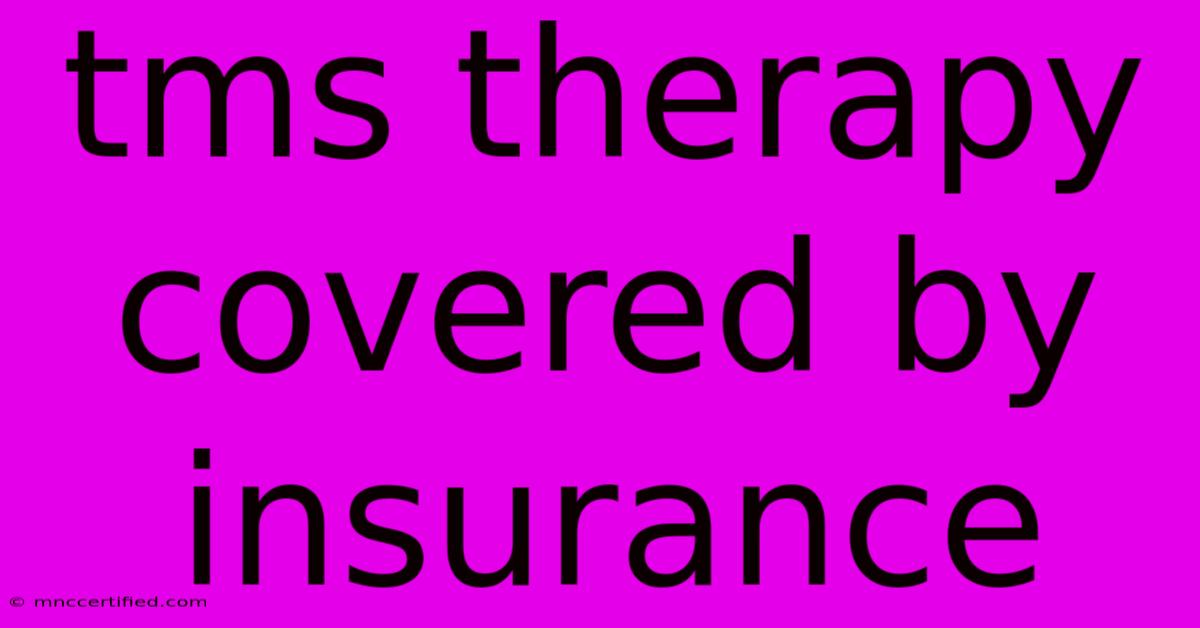Tms Therapy Covered By Insurance

Table of Contents
TMS Therapy Covered by Insurance: A Comprehensive Guide
Transcranial magnetic stimulation (TMS) therapy is a non-invasive procedure used to treat various mental health conditions, primarily depression. Many individuals wonder about the crucial aspect of insurance coverage for this potentially life-changing treatment. This comprehensive guide explores the intricacies of TMS insurance coverage, helping you navigate the process and understand what to expect.
Understanding TMS Therapy and its Applications
TMS therapy uses magnetic pulses to stimulate nerve cells in the brain, aiming to improve symptoms of depression, obsessive-compulsive disorder (OCD), anxiety, and other conditions. It's an outpatient procedure, meaning you don't need to stay overnight in a hospital. The number of sessions required varies depending on the individual and their specific condition.
Key conditions often treated with TMS include:
- Major Depressive Disorder (MDD): This is the most common application of TMS, particularly for those who haven't responded to other treatments.
- Obsessive-Compulsive Disorder (OCD): TMS can help reduce obsessive thoughts and compulsive behaviors.
- Generalized Anxiety Disorder (GAD): While less common, research suggests TMS may benefit those with GAD.
- Post-Traumatic Stress Disorder (PTSD): Studies are ongoing, but TMS shows promise for PTSD treatment.
Does Insurance Cover TMS Therapy?
The short answer is: sometimes. Insurance coverage for TMS varies significantly depending on several factors:
- Your Insurance Provider: Different insurance companies have different policies. Some may fully cover TMS, while others may only partially cover it or not cover it at all. Contacting your insurance provider directly is crucial.
- Your Specific Plan: Even within the same insurance company, coverage can vary depending on your specific plan. Check your policy details or contact your provider to determine your coverage.
- Pre-authorization: Many insurance providers require pre-authorization before TMS treatment begins. This involves submitting your medical records for review to determine medical necessity. Failure to obtain pre-authorization can lead to denied claims.
- Diagnosis: Your diagnosis plays a critical role. Insurance companies are more likely to cover TMS for conditions like MDD when other treatments have failed. A clear diagnosis and well-documented treatment history are essential.
- Location: The location of the TMS treatment center might influence coverage. Some insurance plans might have preferred providers or networks.
Steps to Maximize Your Chances of TMS Coverage
-
Verify Coverage: Contact your insurance provider before starting TMS therapy. Ask about pre-authorization requirements, coverage amounts, and any out-of-pocket expenses you might incur. Request this information in writing for your records.
-
Obtain Pre-authorization: If pre-authorization is required, gather all necessary medical documentation, including your diagnosis, treatment history, and any previous attempts at other therapies. Work closely with your doctor and the TMS clinic to ensure a smooth process.
-
Choose an In-Network Provider (if applicable): If your insurance plan has a network of preferred providers, selecting an in-network TMS clinic can significantly reduce your out-of-pocket costs.
-
Appeal Denied Claims: If your claim is denied, don't give up. Understand the reasons for the denial and gather any additional documentation that might support your appeal. Your doctor can assist you with the appeals process.
-
Explore Financial Assistance Options: If insurance coverage is insufficient, explore options like payment plans, medical loans, or patient assistance programs offered by pharmaceutical companies or TMS clinics.
Finding a TMS Clinic and Doctor
Choosing the right TMS clinic and doctor is vital. Look for facilities with experienced clinicians, advanced technology, and a positive patient reputation. Online reviews and recommendations from your doctor can be valuable resources.
Conclusion
While insurance coverage for TMS therapy isn't guaranteed, proactive planning and thorough communication with your insurance provider and healthcare team significantly increase your chances of receiving the treatment you need. Remember that the potential benefits of TMS for certain mental health conditions can be transformative, making the effort to navigate insurance complexities worthwhile. Don't hesitate to advocate for yourself and seek support to access this valuable therapy.

Thank you for visiting our website wich cover about Tms Therapy Covered By Insurance. We hope the information provided has been useful to you. Feel free to contact us if you have any questions or need further assistance. See you next time and dont miss to bookmark.
Featured Posts
-
Bonded Pair Kittens For Adoption
Nov 21, 2024
-
Ai Fuels Nvidias Revenue Growth
Nov 21, 2024
-
Lainey Wilson Bell Bottoms Missing
Nov 21, 2024
-
One Direction Pays Respects To Liam Payne
Nov 21, 2024
-
Stalker 2 Experience Ukraines Voice
Nov 21, 2024